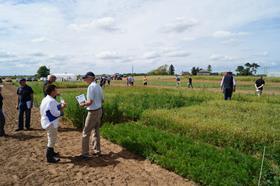
AHDB Horticulture has announced the launch of a new £1.4 million crop protection trial programme, beginning this spring.
The four-year ‘SCEPTRE+’ project will target disease, pest and weed problems, identified as high priorities in the AHDB’s recently-published 2017-2020 horticulture strategy.
These are recognised by sector panels and crop associations as vital areas of research in the fight against a dwindling crop protection armoury.
The programme builds on the success of the original SCEPTRE project, which saw more than 140 chemical and bio-control products trialled in the UK.
The original project, which also lasted four years, tested some of the key conventional chemical and bio-control products that were available for edible crops.
More than 80 chemical pesticides and 60 bio-pesticides were tested on fruit and vegetable crops, field-grown and under protection.
Twelve Extension of Authorisation for Minor Uses (EAMU) have been issued that are directly linked to SCEPTRE, including the emergency authorisation of Benevia 10OD, aimed at helping growers fight the large influx of Diamondback moth last year.
Chemical companies continue to produce new, lower environmental impact actives for use on major world crops.But the number of new actives that become registered for use on horticultural crops is relatively small, largely due to the small size of the markets in relation to development costs.
Dorin Pop of Bayer AG said: “Manufacturers find it uneconomic to test and develop products for ‘minor horticultural crops’. This is where SCEPTRE has added real benefit to growers, to hasten the process and bring chemistry to the industry.”
AHDB Horticulture strategy director Steve Tones added: “SCEPTRE+ has arrived at just the right time, as we embark on a new strategic direction. I have spoken to so many growers who identify crop protection as a high priority to remain competitive and productive.”
“Our sector board wants to focus AHDB levy investment on these activities that add the most value, avoid duplicating work already being done by others, and build our work on cross-cutting themes of broad benefit to all horticulture sectors.”



